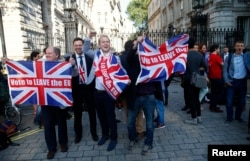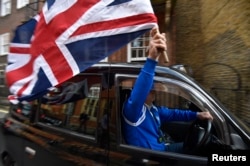The time since Britain's shocking referendum to leave the European Union has brought a number of surprises. Contrary to some predictions, nations largely those of the British commonwealth in Africa and the Pacific - have lined up to sign trade agreements, and economists predict a trade deal with the EU could be in place within two years. At the same time, London is seeing a tourist boom due to the pound's drop.
The British currency plunged more than 10 percent after the June 23 referendum, and that has meant, for many, a chance to see London for the first time.
"It's cheap. Very good. I think it is very, very good," said a tourist from Beijing at Buckingham Palace.
For British businesses, it has been a bonanza. A survey of 500 tourism related businesses done by the Tourism Alliance, a British trade group, showed a dramatic rise in bookings and investment following the referendum. In a report, the group said the number of foreign visitors has jumped by 18 percent since the decision to quit the EU.
Hotels, airlines and visitor attractions in London report a substantial rise in sales and guests - many from Asia - in interviews said they were undeterred by fears of terrorism in Europe.
"I followed the news before coming here, but I am not worried," said He Jinling, a tourist from Zhejiang province in China visiting Buckingham Palace with his wife and son. "Because now the pound is a very low rate, it's cheaper for us to buy things or to travel everywhere. It's a good time to come," he said.
Joy Chen, a university student from Taiwan, agreed. "Terrorism, yeah, we understand, but because the pound is quite low now, so it actually is quite a good time now to travel to London."
The markets have continued to see some volatility after Brexit, which is not a surprise. What is a surprise to some are reports that 27 countries including 10 of the world's largest economies - are expressing interest in securing trade deals with Britain. They include the United States, China and Germany.
Many are commonwealth nations, like Ghana, a former British colony.
Trade opportunities
Economists see opportunity for new trade deals that some believe could change the colonial-era paradigm that has for decades created strange situations in which African farmers could sell their unprocessed products to Europe, only to re-import them as manufactured goods.
"You have Ghanaian cocoa producers unable to go up the value chain and make chocolate because of the way the tariffs system works with Europe. All of this could be solved to some extent in a relationship with a less distorted UK, less agriculturally distorted UK," said Shanker Singham, head of Economic and Prosperity Studies at the Legatum Institute in London.
Britain has not negotiated a trade deal on its own since 1973, presenting the government of new Prime Minister Theresa May with the daunting job of putting together a team of savvy and experienced trade negotiators.
"May's government not only lacks enough civil servants to take on this unprecedented task, which covers so many issues. It is also missing officials to deal with the crucial topic of trade," writes Judy Dempsey of Carnegie Europe.
The deal will require highly skilled negotiators, especially in the case of the EU, where Britain's decision to leave was met with hostility and threats of isolation.
Economists say a British trade deal with the EU could be done in as little as two years. However, negotiations will be difficult, partly because of demands from several countries, including Germany, the Czech Republic and France, which want Britain to grant freedom of movement as a condition for signing trade agreements.
Moment for inflection
Singham's organization has begun work to assemble a commission of experienced trade negotiators to advise the British government. He calls this an inflection moment in history, where Britain has an opportunity to effect enormous change at a time when he says economic stagnation is helping foment nationalist movements and voters are searching for alternatives to the current model.
"There is an opportunity to generate a significant growth engine for the world. The growth engine for the world does not exist right now. It isn't China. It isn't India. It's not the Euro Zone. It's not the U.S," Singham said.
"There's a wave of populism and nationalism that is sweeping the world. The best antidote to nationalism and populism is economic growth and creating economic opportunity, jobs and hope for the world's people," he said.
The number of nations expressing interest in setting up trade deals with Britain has surprised many. The question now is whether Brexit, often billed as a doomsday scenario may with its fresh approach and new opportunities actually end up providing answers for some of the era's most pressing issues.










